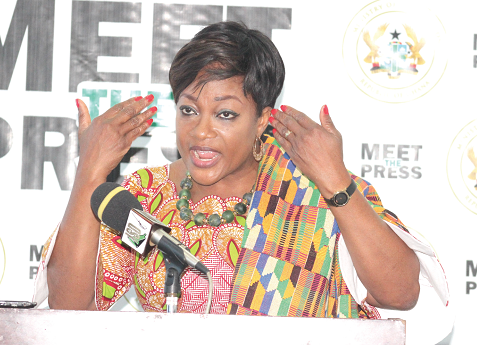
Gender Ministry to get 300,000 people off the streets
The Ministry of Gender, Children and Social Protection has launched an operation to remove more than 300,000 people living on the streets across the country.Dubbed “Operation get off the streets for a better life”, the exercise will identify the number of people living on the streets, profile them and integrate them with their parents, caregivers or the community.
The sector Minister, Ms Otiko Afisa Djaba, who launched the project in Accra yesterday, said statistical evidence showed that there were approximately 300,000 people living on the streets in the country.
Phases of operation
Giving details of the operation, Ms Djaba said it would be implemented in phases and gave the break down as phase one being the short term, phase two, the medium term and phase three, the long term.
The first phase, which she said would last a year, would be for mapping out hotspot areas and identification of shelters across the country.
She said the United Nations Population Fund (UNFPA) had begun creating a database of all people living on the streets to enable the ministry to send those of school age to school for skills training and those with disabilities to rehabilitation centres.
Read Also: 168 Ghanaians in Libya expected back home
Ms Djaba said under phase two of the project, which is expected to last for two years, people identified on the streets would be linked to social protection interventions, such as the school feeding programme, the free senior high school (SHS) policy, the National Health Insurance Scheme (NHIS), among others.
Engagement
Under phase three, she said, those earmarked under the operation would be made to take advantage of opportunities in the hospitality industry, the Planting for Food and Jobs programme, the one-district, one-factory policy, among others.
She said it was expected that the exercise would greatly reduce or completely eradicate the incidence of children, hawkers, beggars, the disabled, destitutes, people with mental illness, among others, living on the streets.
Ms Djaba noted that the increasing number of persons on the streets was an indicator of the weakened extended family value system and explained that the ministry was focusing on the issue due to its ill effects and to bring the prevalence rate under control.
She said the prevalence of people living on and off the streets meant that the governance structure and interventions had not adequately addressed the needs of those vulnerable people.
She said a census conducted on street children in the Greater Accra Region in 2011 showed that 60,495 children lived and worked on the streets of Accra and that out of that number, 66 per cent were migrant children, 18 per cent urban dwellers, among other smaller groups.
“We need to clear the streets of these vulnerable people, especially because the streets are not safe and the ministry is mandated to lead to ensure that the rights and freedoms of vulnerable people are protected,” she said.
Ms Djaba said the operation required massive funding support and, therefore, appealed to development partners, stakeholders and the private sector to step up their support to sustain the initiative.
